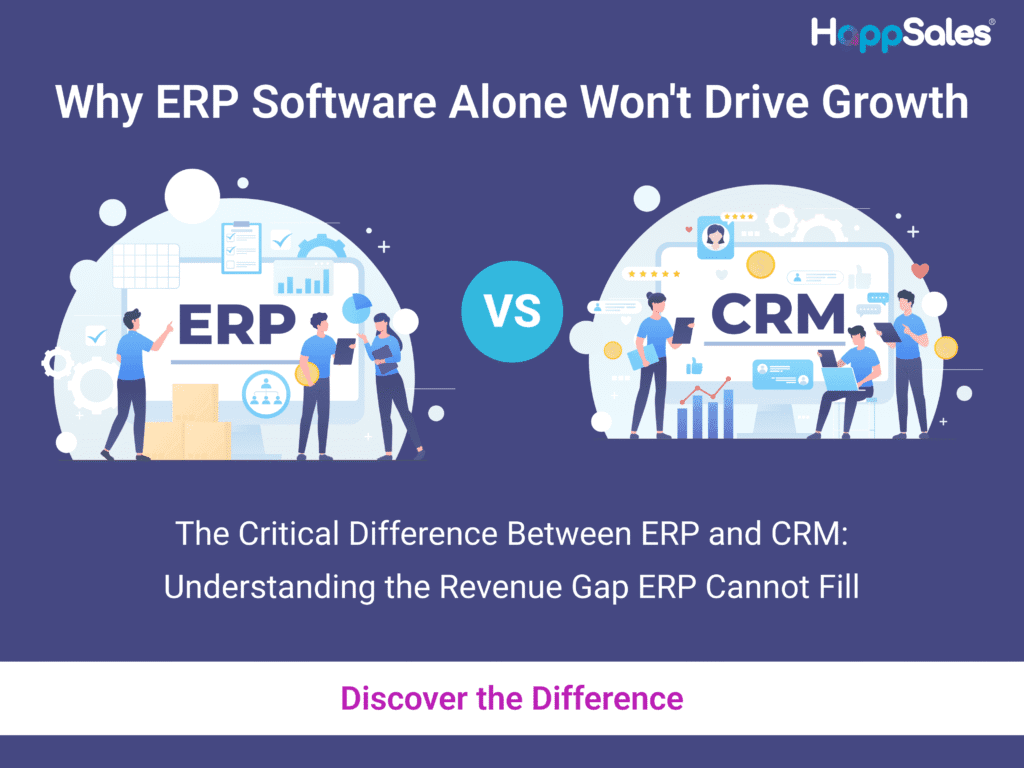Last updated on November 19th, 2025 at 12:56 am
Most growing businesses start their digital journey with an ERP system. It makes perfect sense — ERPs bring order to operations, finance, procurement, inventory, and backend processes that keep the company running.
However, as companies scale, many leaders start noticing a clear pattern:
ERP systems help you run your business… but they don't help you grow your business.
ERP manages what happens inside your business — not how you win, retain, and grow customers.
ERP optimizes operations — not Revenue.
This is where the confusion between ERP vs CRM becomes a costly mistake. While ERP is essential for efficiency and control, it simply cannot drive revenue, customer engagement, or sales acceleration.
Understanding the Core Difference: Back-Office vs. Front-Office
What ERP Systems Do Best: The Operational Backbone
ERP platforms excel at streamlining internal operations:
- Financial management & accounting
- Inventory & warehouse control
- Manufacturing & production planning
- Procurement & supply chain
- HR, payroll & compliance
- Vendor and order processing
- Regulatory reporting
But they only come into play after a customer has made a decision.
What CRM Systems Are Built For: The Revenue Engine
CRM and front-office systems manage the entire customer lifecycle:
- Lead generation & qualification
- Sales pipeline management
- Revenue forecasting & funnel insights
- Customer communication tracking
- Field service management
- Technician dispatch & mobile operations
- Customer support & ticketing
- Renewals, upsell & account growth
The Real Business Impact: What You're Losing Without CRM
The Business Impact of Relying Only on ERP
Many companies attempt to stretch their ERP system to manage sales, customer interactions, or service operations — but this inevitably leads to broken processes, revenue leakages, and dissatisfied customers.
1. ERPs Are Not Built for Sales Teams
ERP systems are designed for internal operations and compliance. Sales teams work in a fast-paced, relationship-driven environment that requires pipeline visibility, activity tracking, forecast accuracy, customer intelligence, and real-time updates. ERP simply cannot support these workflows.
2. ERPs Don't Provide a Revenue Engine
If your goal is to increase new business wins, repeat revenue, cross-sell/upsell, renewal predictability, and sales productivity, then ERP won't get you there. You need a CRM that captures every interaction, every opportunity, and every insight that drives revenue outcomes.
3. ERP Data Is About Transactions — Not Customer Relationships
ERP answers: What was sold?
CRM answers: Why it was sold, who bought it, when will they buy again, and what they need next.
Revenue teams run on context — something ERP data simply does not provide.
4. ERPs Cannot Support Complex Customer Lifecycles
Modern businesses require one integrated cockpit for lead management, sales workflows, service tickets, field operations, account receivables follow-up, and customer experience journeys. ERP systems only handle the transactional part. CRM handles the entire customer lifecycle end-to-end.
Key Differences Between ERP and CRM
| Area | ERP | CRM |
|---|---|---|
| Primary Purpose | Efficiency, operations, finance | Revenue, sales, customer success |
| Focus | Internal processes | Customer-facing processes |
| Drives | Cost control | Growth & predictability |
| Data Type | Transactions | Relationships, interactions |
| Users | Finance, operations, supply chain | Sales, marketing, service, leadership |
| Outcome | Operational efficiency | Higher revenue & better customer experience |
ERP and CRM: Complementary, Not Competing
Instead of ERP vs CRM, the real question should be: How do ERP and CRM work together to drive operational efficiency + revenue growth?
The Winning Combination
ERP brings structure.
CRM brings growth.
Together, they create a unified engine that drives scale.
Final Takeaway
If you are trying to grow, expand, scale, or improve predictability in the business, ERP alone will never be enough.
To build a future-ready business, you need predictable sales, strong customer relationships, efficient service delivery, clear forecasting, and unified front-office operations. ERP alone cannot deliver this. CRM completes the technology stack required for sustainable growth.
Get Started with HappSales Today


